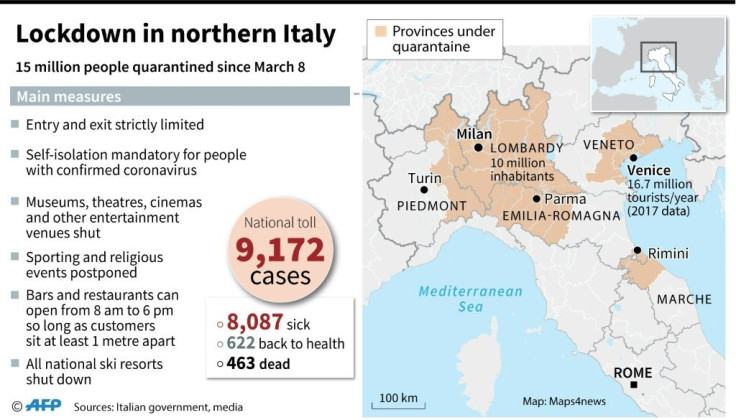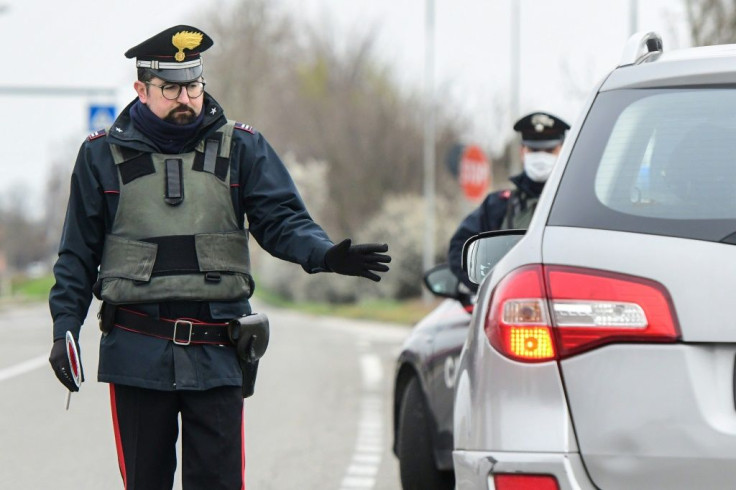Coronavirus Update: Entire Italy On Lockdown As COVID-19 Cases Hit 9,100

KEY POINTS
- A well-intentioned national lockdown in Italy goes horribly wrong
- The lockdown forces people to flee to other parts of Italy and into Europe
- Massive prison riots over COVID-19 restrictions add to Italy's woes
Italy botched up the first day of its unprecedented move to quarantine itself from the rest of the world to prevent the further spread of COVID-19 as masses of Italians -- including the asymptomatic -- fled northern Italy and its cities like Milan, Venice or Padua ahead of national travel restrictions.
This nationwide lockdown is the first such drastic step taken anywhere to combat the spread of COVID-19. It becomes understandable when one realizes Italy enjoys the unenviable distinction of being the second-hardest hit country in the world after China. Italy also has the world's second largest number of deaths. In numbers, this translates into 9,172 confirmed cases and 463 deaths. Most of these casualties are in northern Italy, specifically in Lombardy.
On Sunday, Prime Minister Giuseppe Conte unexpectedly announced the government had extended restrictions already in place in northern Italy -- the country's COVID-19 epicenter -- to the rest of the country. He said the move was taken in order to protect the population, especially the most fragile individuals, such as the elderly.
"All the measure of the red zones are now extended to all of the national territory," said Conte Monday evening as he announced a ban on all public events.
Under the current lockdown rules affecting the north, schools, universities, theaters, cinemas, bars and nightclubs are closed. Religious ceremonies (including funerals and weddings) and sporting events are suspended or postponed. Restaurants and bars are only allowed to be open from 6:00 am to 6:00 pm. Malls and markets can open on weekdays if they can assure a meter (three feet) of distance between each client.
The effects of Conti's announcement would probably have gotten off to a better start if a draft of a lockdown order wasn't published Saturday by the Corriere della Sera (one of the country's most reputable newspapers). Forewarned by the newspaper, people panicked and crowded onto trains Saturday evening to evade the impending government travel restrictions.
The conflicting stories by Corriere and the official government document also ignited confusion across northern Italy. Corriere reported the government was going to stop anyone leaving or entering certain areas of the north. These areas include the entire region of Lombardy, and the provinces of Venice, Modena, Padua and Treviso. The restrictions also affect the cities of Milan and Venice.
The official version, which was only released hours after Corriere published, was unclear and poorly written, and caused massive confusion. It left many people about to come out of quarantine unable to go home or unsure of what they had to do next.
The draft of the decree was later published by other major Italian news outlets. The news saw a flood of people descend onto railway stations across northern Italy with the aim to leave the region. Many people were afraid this might be their last chance to leave until the measures are lifted on April 3.
The chaos at the railway stations also led to fears that infected but asymptomatic people from the north are now carrying the coronavirus to the rest of the country -- and into Europe as well.
"Get off at the first railway station. Don't take planes to Bari and Brindisi,'' implored Michele Emiliano, governor of the southern region of Puglia to northerners. "Turn around in your cars, get off the [intercity] buses at the next stop.''
Prime Minister Conte's announcement was made amid deadly prison riots across the country that saw inmates overrun a number of prisons Monday after visitors were banned to curb the spread of the coronavirus. The riots saw a number of prisoners escape while other inmates took police officers hostage. Italian media is reporting multiple deaths among inmates. More than 350 escaped inmates still control two sections of Rome's Rebibbia prison.

© Copyright IBTimes 2024. All rights reserved.




















